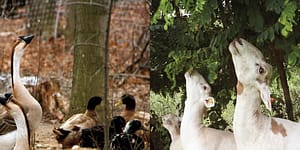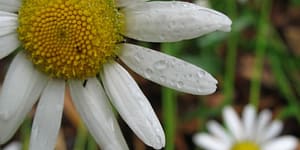History of The Seed Sovereignty Movement: Reclaiming the Seed

Vandana Shiva has been described in many ways: the “Gandhi of Grain,” “a rock star” in the battle against GMOs, and “the most powerful voice” for people of the developing world. For over four decades she been at the forefront of seed saving, seed sovereignty, and connecting the dots between the destruction of nature, the polarization of societies, and indiscriminate corporate greed.
Dr. Shiva’s book, Terra Viva, highlights her most memorable campaigns, alongside some of the world’s most celebrated activists and environmentalists, all working toward a livable planet and healthier democracies. In the excerpt below, Dr. Shiva takes readers along on her journey toward reclaiming the seed.
The following is an excerpt from Terra Viva: My Life in a Biodiversity of Movements by Vandana Shiva. It has been adapted for the web.
Seed: A Definition
Seed is the source of life. Seed creates, recreates, regenerates, and multiplies itself.
Seed is autopoiesis, the poetry of life, written by the orchestra of life, in interconnected autonomy; it is a self- organised interbeing, self-regulating and coherent, from the molecule to the cell, to the organism as a whole. It holds the past of cultural biology and evolution within itself. It enfolds the future potential of unfolding evolution in diversity, vibrancy, resilience.
Seed is neither a machine nor an invention. The abundance and diversity of seeds have been co-created and co-evolved by small farmers, especially women, over centuries. The chemical industry takes farmers’ seeds for free and breeds them into seeds that respond to chemical inputs, or genetically engineers them with toxic genes and patents them, making them non-renewable. Patents on seeds and criminalising seed-saving and seed-exchange violate farmers’ rights to sow, save, exchange, breed, and sell their seeds.
Seed Sovereignty: Working to Reclaim the Seed

Reclaiming the commons of our seeds has been my life’s work for more than three decades now. Inspired by Gandhi, we started the Navdanya movement with a Seed Satyagraha, and declared,
Our seeds, our biodiversity, our indigenous knowledge are our common heritage. We receive our seeds from nature and our ancestors. We have a duty to save and share them, and hand them over to future generations in their richness, integrity, and diversity. Therefore we have a duty to disobey any law that makes it illegal for us to save and share our seeds.
Through imposing laws related to Intellectual Property Rights and patents on seed which deny farmers and gardeners the right to save and share seed, our diversity, freedoms and right to health are being criminalised.
Higher laws that flow from the laws of the earth, reaffirmed by the laws of our humanity, compel us to question and resist the imposition of laws based on uniformity as an instrument of control being forced upon our diversity as peoples, cultures and other species, which we have a duty to protect and defend.
We do not recognise any laws created by corporate interests that interfere in our duty to save and share good seed so that the generations to come are as fortunate as we have been in receiving these gifts of diversity and nourishment.
We will not obey or recognise any law that criminalises our time-tested seeds.
This is our Seed Satyagraha.
Our Seed Satyagraha was launched as a national movement in 1991. When attempts were made to make it illegal for farmers to save seed in Europe, in the US, and in many other countries, the Seed Satyagraha became global.
The Global Seed Satyagraha
In May 2006, Navdanya undertook a Seed Pilgrimage (Bija Yatra) to stop farmers’ suicides and create an agriculture of hope, to reclaim our seed and food sovereignty. The Yatra started from Gandhi’s ashram in Sevagram, Maharashtra, and ended on May 26 in Bangalore. It covered Amravati, Yavatmal and Nagpur in Vidarbha region of Maharashtra; Adilabad, Warangal, Karimnagar and Hyderabad in Andhra Pradesh; and Bidar, Gulbarga, Raichur, Hospet, Chitradurga and Bangalore in Karnataka.
These are the regions where farmers have been locked into dependence on corporate seed supply in order to grow cash crops integrated into world markets, leading to a collapse in farm prices due to subsidies amounting to $400 billion in rich countries.

Article 3j of the Indian Patents Act clearly states that plants, animals and seeds are not inventions, hence not patentable: plants and animals in whole or in any part thereof other than micro organisms; but including seeds, varieties, and species are essentially biological processes for production or propagation of plants and animals. Article 39 of the Indian Plant Variety Protection and Farmers’ Rights Act states, ‘
A farmer shall be deemed to be entitled to save, use, sow, re-sow, exchange, share or sell his farm produce, including seed of a variety protected under this Act, in the same manner as he was entitled to before the coming into force of this Act.’ It was this Article that prevented Pepsi from suing four Indian potato farmers for Rs 10 million each.
In Europe, 180,000 citizens have submitted a petition, ‘No Patents on Seed’, which implies no patents on seeds via genome sequence information. Local laws in Brazil, Argentina and Mexico also prohibit patents on seed.
Battles Over Seed Control
Through patents and their attempts to make it illegal for farmers to use their seeds, the chemical giants began their moves to control seeds worldwide; over the last two decades four giant chemical corporations – Bayer-Monsanto, Dow-Dupont, Syngenta-Chem China and BASF – have taken over control of 60 per cent of the world’s seed supply. Bill Gates is now leading the Gold Rush to control seeds through digital colonisation and Big Data, and is building his empire in partnership with Bayer-Monsanto, Syngenta and the Poison Cartel.
The Iraq War was also a seed war. On April 26, 2004, Paul Bremer, the administrator of the Coalition Provisional Authority (CPA) in Iraq passed Iraqi Order 81, prohibiting Iraqi farmers from using native seeds. Article 14 of the Order states: ‘Farmers shall be prohibited from re-using seeds of protected varieties.’ This was a declaration of war against farmers of the fertile crescent, and it is why I joined hands with Dr Brian John16 and Wafaa’ Al-Natheema,17 and gave a call to movements to celebrate April 26 as International Seed Day in Defence of Seed Freedom:
Therefore, organisations, activists, organic food advocates, farm owners and farmers around the world are joining hands to advocate for patent-free seeds and biodiversity and to educate about the criminal practices by agricultural corporations and how their unjust laws have and will affect the future of agriculture.
India’s Green Revolution was one example of the deliberate destruction of diversity, and new biotechnologies repeat and deepen these tendencies, rather than reverse them. Further, such technologies, combined with patent monopolies, threaten to transform the diversity of life forms into mere raw material for industrial production and limitless profit. They are simultaneously threatening the regenerative freedom of diverse species, as well as the free and sustainable economy of small peasants and producers, based on nature’s diversity and its utilisation.
The seed, for example, reproduces itself and multiplies. Farmers use seed both as grain and as the next year’s crop. Seed is free, both in the ecological sense of reproducing itself, as well as in the economic sense of reproducing farmers’ livelihoods. The seed’s freedom, however, is a major obstacle for seed corporations. If a market for seeds has to be created, the seed needs to be transformed materially, so that its reproducibility is blocked and its status can be changed legally. Instead of being the common property of farming communities, it becomes the patented private property of seed corporations.
Seed Sovereignty As A Symbol of Freedom

I was reminded of Gandhi’s spinning wheel, which became such an important symbol of freedom – not because it was big and powerful but because it was small and could come alive as a force of resistance and creativity in the smallest of huts and the poorest of families. Its power lay in smallness. The seed, too, is small. It embodies diversity. It embodies the freedom to stay alive. And it is still the common property of small farmers in India.
Seed freedom goes far beyond freedom from corporations for the farmer – it signifies the freedom of diverse cultures from centralised control. In the seed, ecological issues combine with social justice. The seed can play the role of Gandhi’s spinning wheel in this period of recolonisation through ‘free trade’. The native seed has become a symbol of resistance against monocultures and monopoly rights.
The shift from uniformity to diversity respects the rights of all species, and is sustainable. Diversity is also a political imperative because it demands decentred control. Diversity as a way of thought and a way of life is what is required to transcend the impoverished monocultures of the mind. The conservation of diversity is the commitment to let alternatives flourish in society and in nature, in economic systems and in knowledge systems.
Cultivating and conserving diversity is no luxury; it is a survival imperative, and a precondition for the freedom of all, the big and the small. In diversity, the smallest element is significant; allowing the small to flourish is the real test of freedom – in the life of an individual, the life of an organisation, the life of a society and the life of this planet. It is this interdependence between diversity, decentredness and democracy which needs to be conserved and cultivated.
Seed and food the world over have been shaped by millions of years of nature’s contribution and centuries of women’s intelligence, skill, hard work and perseverance. Today, women are again in the vanguard of defending seed freedom and food sovereignty in the context of globalisation which, worldwide, has facilitated corporate grab through patents on seeds associated with genetic engineering; they have done this via a mechanistic paradigm of biology and agriculture, and through a reductionist paradigm of the economy.
Women as activists, scientists and scholars are at the forefront of shaping new scientific and economic paradigms to reclaim seed sovereignty and food security across the world. They are leading movements to change both practice and paradigm: how we grow and transform our food. As seed keepers and food producers, as mothers and consumers, they are engaged in renewing a food system that is better aligned with the ecological processes of the earth’s renewal, the laws of human rights and social justice, and the means through which our bodies stay well and healthy.
Recommended Reads
Recent Articles
Have you heard of silvopasture? This system of managing grazing animals is an ancient practice that integrates trees and pasture into a single system for raising livestock. These systems are managed for both forest products and forage, providing short-and long-term income sources in a mutually beneficial way for healthier animals, better soil, less pest control and mowing, and…
Read MoreOxeye daisies are one of the most important plants for pollinators including beetles, ants, and moths that use oxeye daisies as a source of pollen and nectar. Instead of thinking about removing a plant like oxeye daisy, consider how you can improve the fertility and diversity of habitat resources in your home landscape, garden, or…
Read MoreThis long-lived perennial legume is used for forage and erosion control. Kudzu is edible with many medicinal uses and other applications. Pollinators of all kinds love its prodigious lavender blooms!
Read MoreMove aside, maple! We have two new syrups to add to the table. Read on for insights on tapping, selling, and eating syrup from walnut & birch trees.
Read MoreWhy is modern wheat making us sick? That’s the question posed by author Eli Rogosa in Restoring Heritage Grains. Wheat is the most widely grown crop on our planet, yet industrial breeders have transformed this ancient staff of life into a commodity of yield and profit—witness the increase in gluten intolerance and ‘wheat belly’. Modern…
Read More








